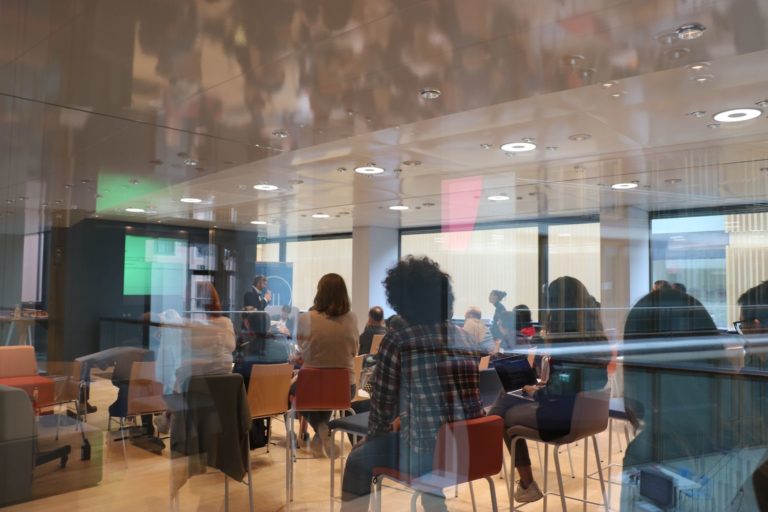
Transatlantic Quantum Forum Tag 1
Ein zentrales Ziel des Transatlantic Quantum Forum war es, Forschung aus der ganzen Welt zusammenzubringen. Um dies zu ermöglichen, haben wir am Abend des ersten Tages die verschiedenen Hubs miteinander vernetzt, um eine digital verbundene Podiumsdiskussion zu verschiedenen Aspekten von Quantentechnologien und ihrem zukünftigen Umgang zu führen.
Ein zentrales Ziel des Transatlantic Quantum Forum war es, Forschung aus der ganzen Welt zusammenzubringen. Um dies zu ermöglichen, haben wir am Abend des ersten Tages die verschiedenen Hubs miteinander vernetzt, um eine digital verbundene Podiumsdiskussion zu verschiedenen Aspekten von Quantentechnologien und ihrem zukünftigen Umgang zu führen.
Der Münchner Hub begrüßte Matthias Kettemann und Joris van Hoboken; gleichzeitig empfing der Hub in New Haven Ido Kilovati und Laura DeNardis. Beide veranstaltenden Institute streamten sämtliche Vorträge nach New Haven und L.A. und ermöglichten so die erste transatlantische Quantum-Erfahrung innerhalb der Wissenschaft.
Matthias Kettemann begann mit einzigartigen Einsichten und Empfehlungen zur zukünftigen Regulierung und Gesetzgebung im Bereich Quantum sowie zum Zugang zu Quantendaten. Dabei zog er Parallelen zum A.I. Data Act und zu Erfahrungen mit Open Data im Kontext aufkommender Technologien. „Wir brauchen kein neues A.I.-Gesetz für Q.T., sondern wir müssen offene normative Leitlinien entwickeln, die mit den bestehenden verknüpft werden“ (Matthias Kettemann). Diese Aussage spiegelt eine der zentralen gemeinsamen Ideen der Konferenzteilnehmenden wider. Zugleich betonten sie jedoch, wie wichtig es sei, die Entwicklung dieser neuen disruptiven Technologie nicht zu behindern.
Anschließend präsentierte Joris van Hoboken in München seine laufende Arbeit zu Quantentechnologien. Joris, ein Quantum-Experte – nicht nur in gesellschaftlichen, politischen und wirtschaftlichen Fragen, sondern auch in technischen Aspekten – stellte einen vertieften Ansatz hinsichtlich der technischen Spezifikationen von Quantentechnologien vor. Er betonte die Notwendigkeit interdisziplinärer Teams, um die Chancen zu nutzen und die Risiken zu bewältigen, die mit der weiteren Entwicklung von Quantentechnologien einhergehen.
Während Quantum schwierige Fragen aufwirft – etwa zum Umgang mit Sicherheitsproblemen und zur Verantwortung bei der Entwicklung und Anwendung entsprechender Lösungen – hob er zugleich das enorme Potenzial von Quantentechnologien für positive Veränderungen hervor, insbesondere im wissenschaftlichen Bereich, wo Quantensimulation erhebliche Umbrüche bewirken wird. Bei der Entwicklung einer Strategie im Umgang mit Quantentechnologien betonte er zudem: „Wir müssen nicht bei null anfangen, sondern uns auf die Aspekte konzentrieren, die einzigartig für Quantentechnologien sind“ (Joris van Hoboken).
Nach diesen inspirierenden Vorträgen, die einige der Chancen und Risiken von Quantentechnologien skizzierten, wurde die Bühne an New Haven übergeben, wo die folgenden beiden Paper-Präsentationen stattfanden.
Zunächst stellte Ido Kilovaty die Risiken für Verschlüsselung vor, einschließlich eines Zeitplans dafür, wann wir im Post-Quantum-Zeitalter ankommen werden, sowie der Frage, wer institutionell verantwortlich sein und einbezogen werden muss, um den bevorstehenden Risiken zu begegnen. In seinem Vortrag legte er die zentralen Risiken dar, betonte die Notwendigkeit institutioneller Konzepte zum Umgang mit möglichen Post-Quantum-Sicherheitslücken und hob hervor, dass Datensicherheit innerhalb des nächsten Jahrzehnts grundlegend neu gedacht werden müsse.
Der letzte Vortrag von Laura DeNardis konzentrierte sich auf Protokolle und die Interoperabilität unterschiedlicher Protokollformate im Hinblick auf das kommende Quanteninternet. Sie argumentierte, dass der Aufstieg des Quanteninternets mit der Entwicklung des frühen Internets vergleichbar sei. Dabei verwies sie auf die komplexe Struktur bestehender Protokolle sowie auf die Notwendigkeit, koordinierte und interoperable Quantenprotokolle vorzubereiten und durchzusetzen – mit besonderem Fokus sowohl auf die Infrastruktur als auch auf die Inhalte.
So unterschiedlich die Vorträge auch waren, hatten sie doch eines gemeinsam: Quantentechnologien werden in der Zukunft eine zentrale Rolle spielen. So vielfältig die Diskussionen waren, sie führten zu derselben Erkenntnis: Quantentechnologien werden eine entscheidende Bedeutung haben. Das Thema kann aus vielen Perspektiven betrachtet werden, was die Komplexität erhöht – insbesondere angesichts der knappen Zeit. Es ist essenziell, die Thematik aus unterschiedlichen Blickwinkeln anzugehen, um ein sicheres und zugleich fruchtbares Quanteninternet zu ermöglichen.